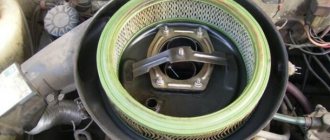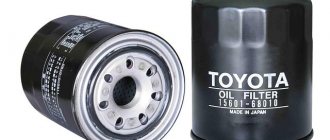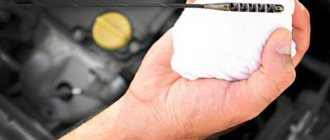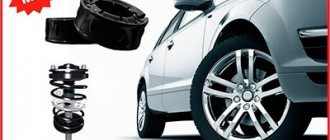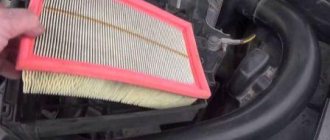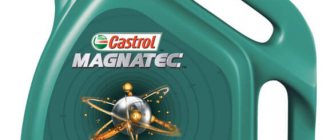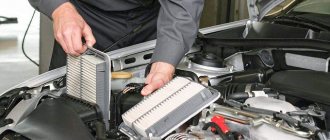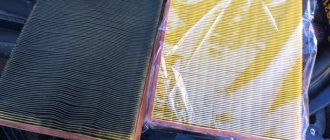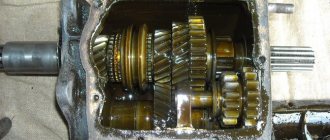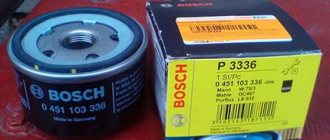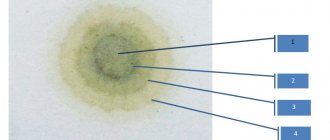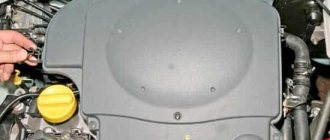Why engine oil can get into the air filter: three reasons
Engine oil should never enter the air filter. If this happens, it means there is a malfunction in the machine. Depending on the reasons for oil getting into the air filter, the nature of the machine repair (minor or major) will be determined.
As a reminder, the air filter is designed to trap debris, dirt, and other particles that may enter the engine. This is why it is so important to change your air filter more often. And even if it looks quite clean. What is the procedure for replacing the air filter in your car can be found in the vehicle manual or in the service book.
If you often get stuck in traffic jams, regularly drive long distances on country highways, and also live in regions where smog is constantly forming in the air from forest fires, grass burning, etc., then it is advisable to reduce the frequency of replacing the air filter, since it will become dirty much faster in such conditions.
Typically, engine oil trapped in the air filter is detected during maintenance, during which not only the engine oil/oil filter is changed, but also the air filter. In principle, oil getting into the filter is not a sign of catastrophic engine failure. But this still cannot be neglected.
What to do to prevent oil from getting into the air filter
The problem with oil getting into the air filter is typical for older engines that have traveled more than 150-200 thousand kilometers. To delay as much as possible the moment when engine oil begins to enter the filter element, it is recommended to properly monitor the engine:
Buy high-quality oil recommended by the car manufacturer. Remember that motor oil from major brands is often counterfeited, so you should purchase the fluid from reputable stores;- Fill the fuel tank with high-quality gasoline;
- Change the air filter every 10-15 thousand kilometers. There is a “golden rule”: the filter should be changed 5 thousand kilometers earlier than the car manufacturer recommends. For example, if the technical manual for a car states that the filter should be changed every 20 thousand kilometers, do this after the car has traveled 15 thousand kilometers.
High-quality consumables are the key to the “health” of the engine. It is better not to skimp on oil, gasoline and filters so that the need for major engine repairs does not appear too early.
( 429 votes, average: 4.60 out of 5)
Cylinder block boring and liner
Alternator belt whistles: main causes and troubleshooting methods
Related Posts
Air filter operation
The air filter on most modern internal combustion engines is located inside the air intake housing, which is mounted at the top of the engine. It is attached to the fuel injection system (or turbine). The air intake is designed to efficiently transport air (oxygen) into the fuel system for mixing with fuel, resulting in an air-fuel mixture that subsequently enters the combustion chamber.
The main job of an air filter is to remove particles of dirt, dust, debris and other impurities before the air mixes with liquid gasoline (or diesel fuel). When the air filter becomes clogged with dirt, it can cause increased fuel consumption and reduced power. If engine oil gets into the air filter, it can also significantly affect engine performance. Let's look at three main reasons why oil can get into the air filter.
Positive crankcase ventilation (PCV) valve clogged
The PCV valve is connected to the air intake housing through a rubber vacuum hose, which is often used to create a vacuum in the crankcase. This component is typically installed on top of the cylinder head valve cover, where pressure flows from the bottom half of the engine through the cylinder heads and into the air intake.
The PCV valve, like the air filter, eventually becomes clogged with excessive debris (in this case, the valve is clogged with engine oil). In this case, the crankcase ventilation valve must be replaced in accordance with your vehicle manufacturer's recommendations. If the PCV valve is not replaced as recommended, excess oil will pass through the PCV valve and enter the air intake system. As a result, the air filter will begin to become clogged with engine oil.
What to do? If it is determined that the cause of oil getting into the air filter is a clogged PCV valve, it should be replaced. It is also necessary to clean the air intake and install a new air filter.
Why oil gets in the air filter and what to do
The air filter is an important consumable component that protects key engine components from dirt, dust, stones, insects and other debris that can harm the stable operation of the engine.
The air filter should be changed every 10-15 thousand kilometers, or in accordance with the manufacturer's recommendations. When replacing, the driver may encounter the problem that traces of engine oil appear on the filter element.
In some situations, the driver pays attention to this due to symptoms of improper operation of the air filter, which has not yet completed its required mileage. It is prohibited to operate a filter that has traces of engine oil for reasons of safety of the car engine.
At the same time, installing a new filter element will not get rid of the problem, since after a few kilometers of run oil traces will appear on it. Before changing an air filter that has traces of oil on it, you should find the problem and fix it.
Worn piston rings
The second potential source of engine oil getting into the air filter housing is wear on the engine piston rings. The rings are installed along the outer edge of the pistons. The rings in the piston group play a very important role. Some rings hold compression inside the engine. Others regulate the thickness of the engine oil film in the combustion chamber during each piston stroke. When the rings wear out, they weaken and can leak engine oil.
This usually results in blue smoke coming out of the exhaust pipe. In the early stages of piston ring wear, excessive oil leakage can lead to excess pressure inside the crankcase, causing more oil to pass through the PCV valve. As a result, oil begins to enter the air intake and then into the air filter.
What to do? If you notice engine oil in the air filter or air intake housing, take your vehicle to a mechanic. Your engine may need diagnostics. For example, you need to measure engine compression to determine whether the rings are worn. An auto mechanic will install a compression gauge on each engine cylinder and check the compression ratio of each of them. If the compression ratio is lower than it should be, then the reason oil is getting into the air filter is due to worn piston rings.
Unfortunately, this repair is not as simple as replacing the crankcase gas recirculation valve. If your car has worn out rings, estimate the cost of rebuilding the engine. It is quite possible that you will not be satisfied with the price tag. This is especially true for owners of old cars, where engine repairs can cost much more than the cost of the entire car. In this case, it will be easier to sell the car and buy a newer one.
What causes oil to appear in the air filter?
Let's figure out why oil appears in the air filter most often on used cars.
The reasons are as follows:
1. Critical wear of piston rings. Such a malfunction is a common occurrence when the engine is heavily worn. As a result, there is insufficient collection of oil entering the crankcase from the cylinder.
Then excessive pressure appears, which literally squeezes the lubricant through the ventilation valve and oil deflector. You know the further path.
2. The appearance of blockages in the drain of the main oil deflector. Such a malfunction leads to the fact that excess oil cannot return to the crankcase.
He has no other choice but to go along with the crankcase gases. As a result, excess lubricant ends up on the filter.
3. Blockages in the paths through which crankcase gases are redirected beyond the throttle. For example, one of the channels or hoses may be clogged. In this case, the flow of crankcase gases drives oil into the air filter. You see the result.
4. Dirty filter element. The cause of such problems may be untimely replacement of the filter. In this situation, it is difficult for air to enter the engine.
The latter begins to “choke” and draw air from other places (the crankcase becomes one of the sources). So timely replacement of the filter element is very important.
Oil channels clogged
The last possible reason for engine oil getting into the air intake system (which will eventually clog even a new air filter pretty quickly) is clogged engine oil passages.
This symptom usually occurs when the engine oil and oil filter have not been changed in accordance with technical regulations. That is, when the car exceeded the mileage limit at which it was necessary to change the oil and filter.
If you frequently change your engine oil at the wrong time, excessive carbon deposits and sludge will begin to form inside the engine (especially inside the crankcase). When oil does not circulate inside the engine as it should, excess engine oil pressure is created, causing oil to be forced through the crankcase vent valve. Next, the oil enters the air intake and ends up in the air filter.
What to do? In this case, it is enough to replace the engine oil and filter. The PCV crankcase valve and air filter also need to be replaced. However, if the engine oil circulation is caused by carbon deposits, it is recommended that you also flush the engine before adding new lubricant. And that is not all.
Car mechanics advise changing the oil and oil filter several more times every 1500-3000 km to be sure that the oil deposits in the engine are gone. Moreover, changing the oil after a short period of time must necessarily take place after flushing the engine of old oil.
